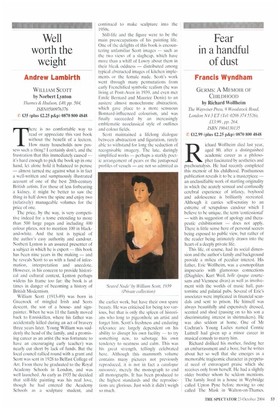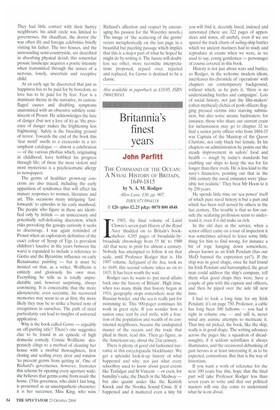in a handful of dust
Francis Wyndham
GERMS: A MEMOIR OF CHILDHOOD by Richard Wollheim The Waywiser Press, 9 Woodstock Road, London N4 3 ET (Tel: 0208 374 5526), £13.99, pp. 264, ISBN 1904130135 £12.99 (plus 0.25 p&p) 0870 800 4848 Richard Wollheim died last year, aged 80, after a distinguished academic career as a philosopher fascinated by aesthetics and psychoanalysis. He had recently completed this memoir of his childhood. Posthumous publication reveals it to be a masterpiece — an unclassifiable work of startling originality in which the acutely sensual and confusedly cerebral experience of infancy, boyhood and adolescence is brilliantly recreated. Although it carries self-scrutiny to an extreme of scrupulous candour which I believe to be unique, the term 'confessional' — with its suggestion of apolog and therapeutic exhibitionism — does not apply. There is little sense here of personal secrets being exposed to public view, hut rather of the reader being intimately drawn into the heart of a deeply private life.
This life, of course, had its social dimension and the author's family and background provide a milieu of peculiar interest. His father, Eric Wollheim, was a cosmopolitan impresario with glamorous connections (Diaghilev, Kurt Weil, belle Cpoque courtesans and Viennese divas) as well as involvement with the worlds of music hall, pantomime and palatial pubs. Several of Eric's associates were implicated in financial scandals and sent to prison. He himself was always beautifully and expensively dressed, scented and shod (passing on to his son a discriminating interest in shirtmakers). He was also seldom at home. One of Mr Cochran's Young Ladies named Connie Luttrell had given up a minor career in musical comedy to marry him.
Richard disliked his mother, finding her an embarrassment and a bore, but he writes about her so well that she emerges as a memorable tragicomic character in perpetual need of extravagant praise which she receives only from herself. He had a slightly older brother whom he seldom mentions. The family lived in a house in Weybridge called Upton Pyne before moving to one called The Mask in Walton-on-Thames.
They had little contact with their Surrey neighbours: his adult circle was limited to governesses, the chauffeur, the doctor (he was often ill) and foreign celebrities briefly visiting his father. The two houses, and the surrounding semi-countryside, are described in absorbing physical detail; this somewhat prosaic landscape acquires a poetic intensity when transmitted through the senses of a nervous, lonely, uncertain and receptive child.
At an early age he discovered that just as happiness has to be paid for by boredom, so love has to be paid for by fear. Fear is a dominant theme in the narrative, its camouflaged causes and disabling symptoms anatomised with an obsessive subtlety reminiscent of Proust. He acknowledges the lure of danger (but not a love of it) as 'the presence of danger makes the frightening less frightening'. Safety is the breeding ground of terror. Towards the end of the book this 'fear motif swells to a crescendo in a triumphant catalogue — almost a celebration — of the various phobias which, originating in childhood, have hobbled his progress through life; of these the most violent and most mysterious is a psychosomatic allergy to newspapers.
The germs of healthier grown-up concerns are also traced, including the early apparition of syndromes that will effect his mature responses to women, literature and art. This occasions many intriguing 'fastforwards' to episodes in his early manhood. The people who figure in these are identified only by initials — an unnecessary and potentially self-defeating discretion, which risks provoking the gossipy curiosity it seeks to discourage. I was again reminded of Proust when an exploratory definition of the exact colour of Syrup of Figs (a prevalent children's laxative in the years between the wars) is expanded to include a reference to Giotto and the Byzantine influence on early Renaissance painting — but it must be insisted on that, as a writer, Wollheim is entirely and gloriously his own man. Everything he tells us is totally unpredictable and, however surprising, always convincing. It is conceivable that the more idiosyncratic, even eccentric, his recovered memories may seem to us at first, the more likely they may be to strike a buried note of recognition in ourselves. The path of strict particularity can lead to insights of universal application.
Why is the book called Germs — arguably an off-putting title? There's one suggestive clue to be found in an episode of high domestic comedy. Connie Wollheim desperately clings to a method of cleaning her house with a morbid thoroughness, first closing and sealing every door and window 'to prevent germs from getting in'. One of Richard's governesses, however, frustrates this scheme by opening every aperture wide: she believes that germs come from inside the home. (This governess, who didn't last long, is presented as an unsympathetic character; it is her successor, Miss King, who wins Richard's affection and respect by encouraging his passion for the Waverley novels.) The image of the scattering of the germs' recurs metaphorically on the last page in a beautiful but puzzling passage which implies that this is a major part of what he hoped he might do by writing it. The future will doubtless see other, more recondite interpretations proposed, argued over, rejected and replaced, for Germs is destined to be a classic.

























































































 Previous page
Previous page